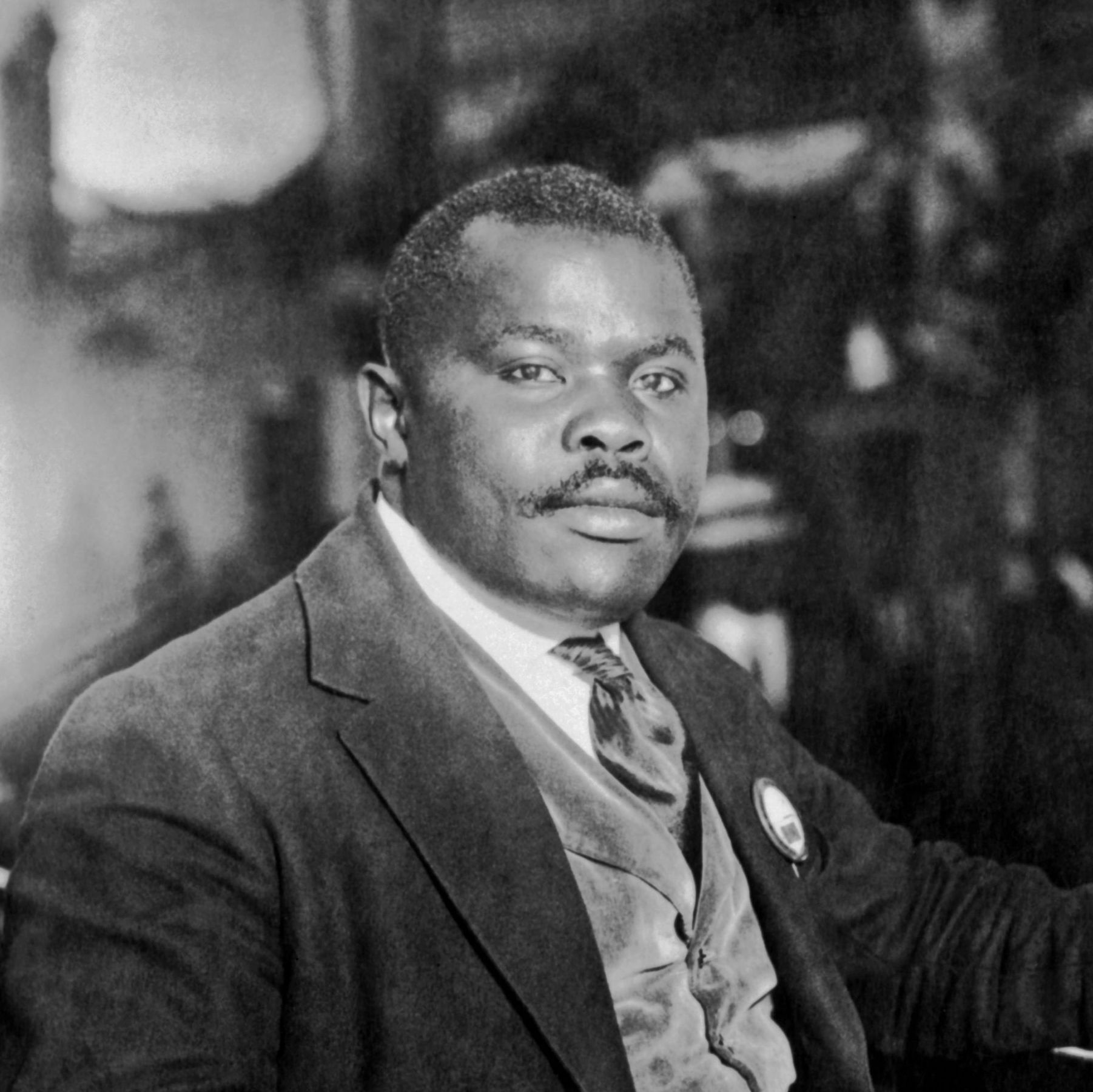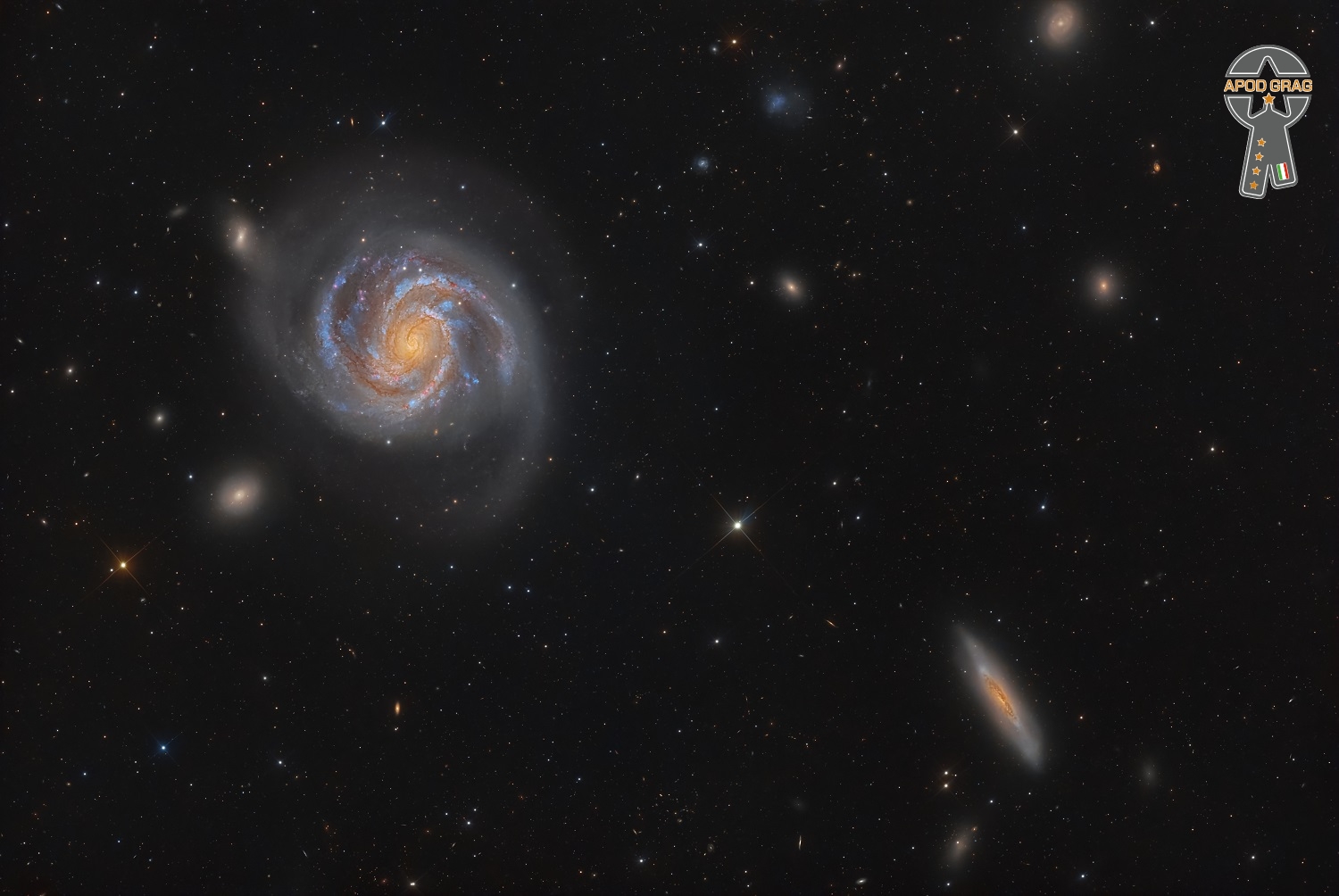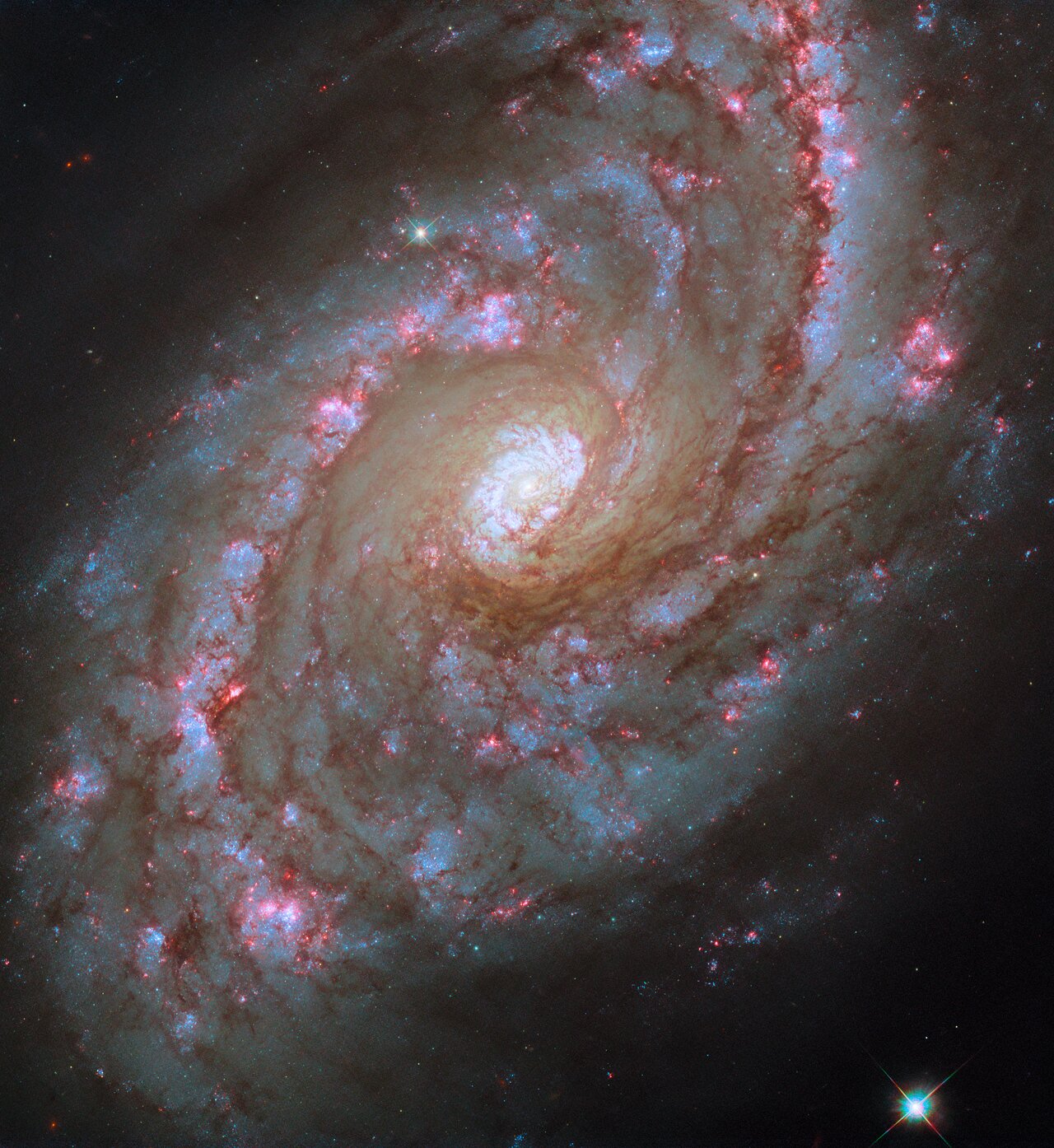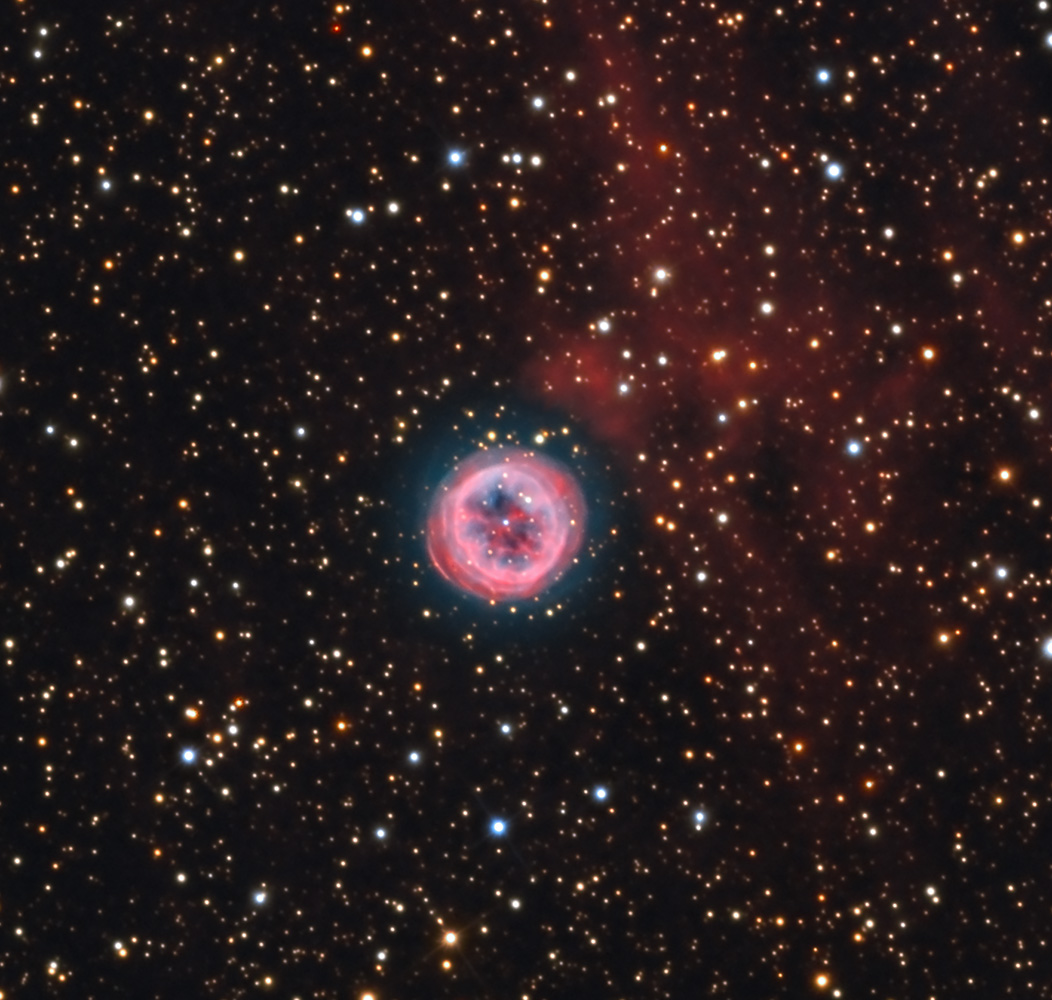Blog
“Never forget that intelligence rules the world and ignorance carries the burden. Therefore, remove yourself as far as possible from ignorance and seek as far as possible to be intelligent.”
Marcus Garvey

The M100 galaxy, cataloged as Messier 100 and NGC 4321, is one of the most impressive and widely studied spiral galaxies in the sky. Located in the Berenice’s Hair constellation, approximately 53 million light years from us,
M100 is an important part of a large group of galaxies located in our cosmic neighborhood : Virgo cluster.
M100 is listed as a spiral galaxy, implying that it has well-defined and symmetrical spiral arms that move out from its central core. With a diameter of approximately 160,000 years light, this galaxy is considered one of the largest and most luminous in the Virgo cluster, making it larger than our Milky Way.
Its spiral arms are home to around 100 billion stars, with magnificent young massive blue stars, gaseous nebulae and dust clouds.
The arms are places where star formation is very active, supported by the vast reserves of gas present in the galaxy.
M100 is also notable for the large number of supernovae that have been observed within it. Over the past century, five supernovae have been observed, the most recent of which is SN 2006X, a Type Ia supernova, which was discovered in February 2006. Astronomers are very interested in Type Ia supernovae because they are a standard for measuring cosmic distances, which contributes to the study of the expansion of the universe.
Just like most spiral galaxies, M100 has an active galactic core that could host a supermassive black hole. Its rotation has been carefully studied to understand the distribution of dark matter in the galaxy.
Astronomers have discovered that the outer parts of the galaxy rotate at a faster rate than visible matter alone could explain, providing further evidence for the presence of dark matter.
We can observe several galaxies and cosmic objects in our image,
in particular the famous galaxy NGC 4312. It is a spiral galaxy of type SA(rs)bc, distant about 55 million light years from Earth. She too is a member of the Virgo cluster.
Compared to other spiral galaxies, NGC 4312 is distinguished by its inclination, offering an almost “edge-on” view, which makes the observation of its spiral structure more delicate.
NGC 4312 spans about 45,000 light years, making it a relatively small galaxy compared to M100.

James Hamish Stuart (born 8 October 1949) is a Scottish guitarist, bassist, singer, composer and record producer. He was an original member of the Average White Band. Born in Glasgow, Scotland, Stuart attended Queens Park School in Glasgow and left to form his first professional band ‘The Dream Police’.
He recorded a couple of singles with the Dream Police before he was invited to join the recently-formed Average White Band (AWB) in June 1972.
A member of AWB from 1972 to 1982, he went on to work with Aretha Franklin, Chaka Khan, and David Sanborn.
He wrote Atlantic Starr‘s 1986 hit “If Your Heart Isn’t in It” and songs for Smokey Robinson, Jeffrey Osborne, George Benson, and Diana Ross.
more...Owen Joseph “Sonny” Igoe (October 8, 1923 – March 28, 2012) was an American jazz drummer and music educator who, toured with the orchestras of Tommy Reed (1913–2012), Les Elgart, Ina Ray Hutton, Benny Goodman, and Woody Herman from the mid-1940s to the mid-1950s.
From the mid-1940s to 1988, he performed on over 79 recordings with bands and artists, including The Buddy Stewart (1922–1950) Quintet, Benny Goodman and His Orchestra, Woody Herman and His Orchestra, Frances Wayne with Neal Hefti and His Orchestra, Rita Moss with the George WilliamsOrchestra, Charlie Ventura, Tony Bennett, Billy Maxted and His Manhattan Jazz Band, The Chuck WayneQuintet, The Don Elliott Quintet, Joe Wilder, Phil Napoleon and His Original Memphis Five, Sammy Spear (né Samuel Shapiro; 1909–1975), Pee Wee Erwin, Joe Williams, Marlene Ver Planck (born 1933), Savina (Savina J. Hartwell; 1926–1992), Dick Meldonian (né Richard Anthony Meldonian; born 1930), and Doctor Billy Dodd.
more...Park Frederick “Pepper” Adams III (October 8, 1930 – September 10, 1986 Highland Park, MI) was an American jazzbaritone saxophonist and composer. He composed 42 pieces, was the leader on eighteen albums spanning 28 years, and participated in 600 sessions as a sideman. He worked with an array of musicians, and had especially fruitful collaborations with trumpeter Donald Byrd and as a member of the Thad Jones/Mel Lewis Big Band. At age 16, Adams and his mother moved to Detroit, where he soon began playing with Willie Wells, who he had heard play for Fletcher Henderson, Fats Navarro, Tommy Flanagan, and Willie Anderson. He had received casual instruction from Wardell Gray and Billy Mitchell, and played with a group led by Little John Wilson as well. Through the employee discount from his job at Grinnell’s, a music store in Detroit, Adams purchased what would become his main instrument: the baritone saxophone. He initially purchased a used Bundy baritone saxophone, but later traded it in for a new Selmer ‘Balanced Action’ E-flat baritone in 1948, which he used until 1978. This switch proved to be successful, as he was soon playing in Lucky Thompson‘s band. In Detroit, Adams also met several jazz musicians who would become future performing partners, including trumpeter Donald Byrd. He attended Wayne State University. Adams became interested in Wardell Gray’s approach to the saxophone, later naming Gray and Harry Carney as his influences. He spent time in a United States Army band, and briefly had a tour of duty in Korea.
more...
The sparkling scene depicted in this week’s Hubble Picture of the Week is of the spiral galaxy NGC 5248, located 42 million light-years from Earth in the constellation Boötes. It is also known as Caldwell 45, having been included in a catalogue of visually interesting celestial objects that were known, but weren’t as commonly observed by amateur astronomers as the more famous Messier objects.
NGC 5248 is one of the so-called ‘grand design’ spirals, with prominent spiral arms that reach from near the core out through the disc. It also has a faint bar structure in the centre, between the inner ends of the spiral arms, which is not quite so obvious in this visible-light portrait from Hubble. Features like these which break the rotational symmetry of a galaxy have a huge influence on how matter moves through it, and eventually its evolution through time. They feed gas from a galaxy’s outer reaches to inner star-forming regions, and even to a galaxy’s central black hole where it can kick-start an active galactic nucleus.
These flows of gas have shaped NGC 5248 in a big way; it has many bright ‘starburst regions’ of intense star formation spread across its disc, and it is dominated by a population of young stars. The galaxy even has two very active, ring-shaped starburst regions around its nucleus, filled with young clusters of stars. These ‘nuclear rings’ are remarkable enough, but normally a nuclear ring tends to block gas from getting further into the core of a galaxy. NGC 5248 having a second ring inside the first is a marker of just how forceful its flows of matter and energy are! Its relatively nearby, highly visible starburst regions make the galaxy a target for professional and amateur astronomers alike.

Yo-Yo Ma (born October 7, 1955) is an American cellist. Born to and partially raised by Chinese parents in Paris and educated in New York City, he was a child prodigy, performing from the age of four and a half. He graduated from the Juilliard School and Harvard University, attended Columbia University, and has performed as a soloist with orchestras around the world. He has recorded more than 92 albums and received 19 Grammy Awards.
In addition to recordings of the standard classical repertoire, Ma has recorded a wide variety of folk music, such as American bluegrass music, traditional Chinese melodies, the tangos of Argentine composer Astor Piazzolla, and Brazilian music. He has also collaborated with artists from a diverse range of genres, including Bobby McFerrin, Carlos Santana, Chris Botti, Diana Krall, James Taylor, Miley Cyrus, and Sting.
Ma has been a United Nations Messenger of Peace since 2006. He has received numerous awards, including the Avery Fisher Prize in 1978, The Glenn Gould Prize in 1999, the National Medal of Arts in 2001, the Presidential Medal of Freedom in 2011, Kennedy Center Honors in 2011, the Polar Music Prizein 2012, and the Birgit Nilsson Prize in 2022. He was named as one of Time‘s 100 Most Influential People of 2020.
Ma’s primary performance instrument is the Davidov cello, made in 1712 by Antonio Stradivari.
more...Mel Brown (October 7, 1939 – March 20, 2009) was an American-born blues guitarist and singer. He is best remembered for his decade-long backing of Bobby Bland, although in his own right Brown recorded over a dozen albums between 1967 and 2006.
Brown was born in Jackson, Mississippi, United States, and was presented with his first guitar as a teenager while recovering from a bout of meningitis. By 1955, after performing backing duties for both Sonny Boy Williamson II and Jimmy Beasley, Brown had a two year long stint backing Johnny Otis. This led to work with Etta James, where he swapped his Gibson Les Paul for an ES-175 to give him a richer and fuller tone to his guitar work, that set him apart from his contemporaries.
The stress of constant touring led him to Los Angeles, California, to resume work with Otis, spending an extended residency at the Club Sands. Further session duties saw Brown back Bobby Darin and Bill Cosbyamong others, as well as performing on T-Bone Walker‘s Funky Town. ABC Records producer Bob Thiele offered Brown the chance to record his own material, and Brown released Chicken Fat in 1967. Though principally a blues musician, Brown would also transition into jazz and soul jazz through his association with Bob Thiele, including a prominent role with the Oliver Nelson Big Band and appearing on Live from Los Angeles (released by Impulse!).
more...
Larry Young (also known as Khalid Yasin [Abdul Aziz]; October 7, 1940 – March 30, 1978) was an American jazz organist and occasional pianist. Young’s early work was strongly influenced by the soul jazzof Jimmy Smith, but he later pioneered a more experimental, modal approach to the Hammond B-3. Born and raised in Newark, New Jersey, United States, Young attended Newark Arts High School, where he began performing with a vocal group and a jazz band. He was also the cousin of the drummer Jimmie Smith.
Young played with various R&B bands in the 1950s, before gaining jazz experience with Jimmy Forrest, Lou Donaldson, Kenny Dorham, Hank Mobley and Tommy Turrentine. Recording as a leader for Prestigefrom 1960, Young made a number of soul jazz discs, Testifying, Young Blues and Groove Street. When Young signed with Blue Note around 1964, his music began to show the marked influence of John Coltrane. In this period, he produced his most enduring work. He recorded several times as part of a trio with guitarist Grant Green and drummer Elvin Jones, who were occasionally augmented by additional players. Most of these albums were released under Green’s name, though Into Somethin’ (with Sam Riverson saxophone) became Young’s Blue Note debut. Unity, recorded in 1965, remains his best-known album; it features a front line of Joe Henderson and the young Woody Shaw. Subsequent albums for Blue Note (Contrasts, Of Love and Peace, Heaven On Earth, Mother Ship) also drew on elements of the 1960s avant-garde and utilised local musicians from Young’s hometown of Newark. Young then became a part of some of the earliest fusion groups: first on Emergency! with the Tony Williams Lifetime (with Tony Williams and John McLaughlin) and also on Miles Davis‘s Bitches Brew. His sound with Lifetime was made distinctive by his often very percussive approach and regular heavy use of guitar and synthesizer-like effects. He is also known for a jam he recorded with rock guitarist Jimi Hendrix, which was released after Hendrix’s death on the album, Nine to the Universe.
In March 1978, he checked into a hospital for stomach pains. He died there on March 30, 1978, while being treated for what is said to be pneumonia.However, the actual cause of his death is unclear.
more...Jonathan David Samuel Jones (October 7, 1911 – September 3, 1985) was an American jazz drummer. A band leader and pioneer in jazz percussion, Jones anchored the Count Basie Orchestra rhythm section from 1934 to 1948. He was sometimes known as Papa Jo Jones to distinguish him from younger drummer Philly Joe Jones. Born in Chicago, Illinois, United States, Jones moved to Alabama, where he learned to play several instruments, including saxophone, piano, and drums. He worked as a drummer and tap-dancer at carnival shows until joining Walter Page‘s band, the Blue Devils in Oklahoma City in the late 1920s. He recorded with trumpeter Lloyd Hunter‘s Serenaders in 1931, and later joined pianist Count Basie‘s band in 1934. Jones, Basie, guitarist Freddie Green and bassist Walter Page were sometimes billed as an “All-American Rhythm section,” an ideal team. Jones took a brief break for two years when he was in the military, but he remained with Basie until 1948. He participated in the Jazz at the Philharmonic concert series.
He was one of the first drummers to promote the use of brushes on drums, and shifting the role of timekeeping from the bass drum to the hi-hat cymbal. Jones had a major influence on later drummers such as Buddy Rich, Kenny Clarke, Roy Haynes, Max Roach, and Louie Bellson. He also starred in several films, most notably the musical short Jammin’ the Blues (1944).
more...The planetary nebula NGC 6894 was discovered by William Herschel on 17th July 1784. With an angular diameter of around 40 arc minutes, it appears about as large as Jupiter, but is much fainter: around 14 magnitudes. The distance is about 1669 pc (about 5400 light years).

Millicent Dolly May Small CD (6 October 1947 – 5 May 2020) was a Jamaican singer who is best known for her international hit “My Boy Lollipop” (1964). The song reached number two in both the UK and US charts and sold over seven million copies worldwide. It was also the first major hit for Island Recordsand helped to achieve the label its mainstream success. She was the Caribbean’s first international recording star and its most successful female performer. Millicent Dolly May Small was born on 6 October 1947 in Clarendon, Jamaica, the daughter of a sugar plantation overseer. She was one of 13 siblings, with seven brothers and five sisters. Like many Jamaican singers of the era, her career began by winning the Vere Johns Opportunity Hour talent contest at the age of twelve. Wishing to pursue a career as a singer, she moved to live with relatives in Love Lane in Kingston. She auditioned for Studio One record producer Coxsone Dodd, who was struck by the similarity of her voice to that of Shirley Goodman of the American duo Shirley and Lee. He paired her with singer Owen Gray, and they made several records together, including “Sugar Plum”, which became a local hit.
more...More Posts
- Daily Roots The Silvertones
- Holocaust Remembrance Day 2025
- Cosmo Supernova SN 2022aajn
- Wolfgang Amadeus Mozart
- Bobby Hutcherson
- Elmore James
- World Music Barcelona Gypsy Klezmer Orchestra
- Daily Roots Dub Specialist
- Angela Davis Change
- Cosmo C/2024 G3 (ATLAS)
- Corky Laing
- Huey “Piano” Smith
- Coxsone Dodd
- Stéphane Grappelli
- World Music Abdallah Oumbadougou
- Daily Roots Silvertones
- Echos of Freedom with Maya Angelou
- Happy Kumbh Mela 2025
- Cosmo NGC 1333
- Etta James

